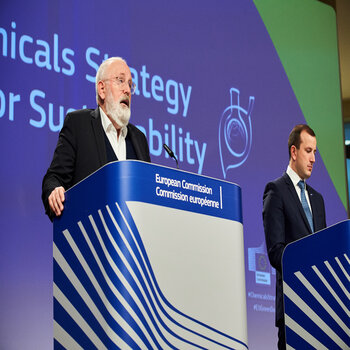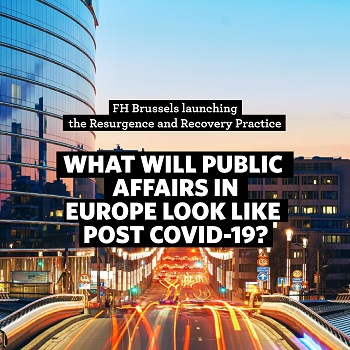Food, Beverage & Agriculture
The ambition of the European Green Deal is to deeply transform our food systems, from farm to fork, to make Europe’s food supply chains more sustainable. This will require profound changes to the current EU regulatory and policy environment related to agriculture and fisheries, food composition and food labelling.
The FH Brussels Food, Agriculture and Beverage practice can help you navigate these changes, identify the impact it can have on you and how to leverage the opportunities it will create.
What can we expect from the EU’s Farm to Fork Strategy?
The Farm to Fork Strategy was published in May 2020 setting out the roadmap for the European Union’s transition to a more sustainable food system. The aim of the Strategy is clear, as underlined by Executive Vice President Timmermans and Commissioner Kyriakides: the EU will make sustainability a key pillar of its food policy and will set a global standard for sustainable supply chains.
It asserts the need for concerted EU action to improve our diets while also tackling the impacts of food production on climate change, biodiversity loss, land and water use, as well as nutrient cycles. Safety, quality and transparency will continue to be the foundations of EU food policy. But the Strategy marks a paradigm shift by moving the focus from food production and agriculture to food systems, and by putting sustainability at the forefront.
We have strong experience in supporting actors in the food supply chains in advocacy and communications activities in Europe, at both EU and national levels.
The EU will encourage natural, sustainable and safe food production
Agriculture accounts for approximately 10% of the EU’s total GHG emissions (2015) and food systems remain one of the key drivers of climate change and environmental degradation. Greening EU’s agriculture is consequently imperative to meet the EU’s ambition for climate neutrality.
Our climate policy experts help clients navigate this complex regulatory agenda and ensures their effective communication about climate initiatives and commitments.
To promote safer, healthier and sustainable food products, the European Commission is looking to decrease of the use of chemical pesticides and fertilisers. The discussions on GMOs and new breeding techniques will also continue over the coming years.
FleishmanHillard has deep expertise in all of these areas, including on support the plant protection and fertilisers industry through various legislative, regulatory and communications challenges.
Enhanced transparency and safety requirements in food consumption
The Farm to Fork Strategy recognises the essential role of consumer demand in driving change. To this end, the European Commission aims to foster the transparency of information communicated to consumers about the food they consume.
To help consumers make informed choices, the Commission will propose a harmonised mandatory front-of-pack nutrition labelling. It will also examine ways to harmonise voluntary green claims and to create a sustainable labelling framework that covers the nutritional, climate, environmental and social aspects of food products.
At FH, our experts have long supported clients to find practical and workable solutions with EU and national authorities to food transparency issues, such as labelling. We also support companies to communicate about the complex challenges regarding environmental footprint of food products.
In parallel, there will be significant focus on continuously developing the requirements on food safety. From the definition of food additive and clean labelling to the regulation of food contact materials, our experts have years of experience in supporting producers on food safety issues.
Food companies expected to make firm commitments on health and sustainability
Whether driven by regulation, consumer demand or societal expectations, food companies are expected to adopt ethical, sustainable business practices. These range from labelling, sourcing and animal welfare to environmental stewardship.
To ensure a swift uptake of these measures, the European Commission also announced it will be working on an EU Code of Conduct for responsible business and marketing practices in the food sector, as well as an initiative to improve corporate governance and ensure the food industry integrate sustainability into corporate strategies.
FleishmanHillard’s team has long-standing experience working with clients on navigating regulatory requirements and managing companies’ reputations.
Our services
While already severely affected by the COVID-19 crisis, the food, agriculture and beverage sector will likely continue to face regular challenges, from the health impact of the food we consume to scrutiny about how food is produced, packaged and shipped. Anticipating and juggling these expected systemic changes will be critical for the agri-food supply chain.
From stakeholder engagement, commodity and brand marketing to issues and crisis management, FleishmanHillard is dedicated to protecting and building your reputation and brands by allowing you to stay out in front of issues and trends.
We have expertise not only in food and agriculture but also in many other policy fields affecting the sector, like trade policy and the future EU-UK relationship, packaging and food contact materials regulations, or digital transformation and e-commerce.
- Positioning, reputation and political counsel
We help you understand the political dynamics which can impact your company and products. Gathering the latest intelligence, we will assist you in identifying the key opportunities and risks of the EU’s food and agriculture agenda, and build your reputation.
As your political advisor, we will give you insights on what is going on behind the scenes in Brussels and at national level and provide thought leadership on the future political context for your business.
- Execution of advocacy programmes
We support you in selecting effective engagement tactics to ensure your voice is heard in Brussels and at national level through every step of policy making. Be it for legislative or regulatory processes, our team prepares and facilitates your outreach to the EU’s policymakers in the European Commission, Parliament, in EU Member States but also the European Food Safety Authority (EFSA) or the European Chemicals Agency (ECHA) when relevant.
In addition to providing you with the required essential materials and logistical support for advocacy, we can directly support you when meeting policymakers.
Since measuring success is critical to evaluate the benefits of your engagement, we give you tools that enable you to track the progress of engagement and provide you with a full assessment of results.
- Integrated campaigns, communications, third-party mobilisation and media
Any political debate is shaped by perception, we help you manage the external noise that affects your case and to mobilise your supporters.
We have extensive experience and expertise on communicating to policymakers. We help you in selecting the best communications channels for your issue, in the development of striking content and dissemination to your audiences, including media and digital tools.
Our team regularly engages with the media on various issues. We have experience in both proactively and reactively engaging with media in Brussels and across the EU, including crisis communications.
Value-chain engagement and mobilisation is often essential to meet advocacy and communications objectives. Our team has a wide network in Brussels and a track record of successfully mobilising support in favour of our client’s cases and creating alliances.
We also help you raise your profile through event organisation and speaking opportunities that position you at the heart of the policy debate.
Food, Beverage & Agriculture News & Opinions
-
Wind of change
July 13, 2023
-
The EU’s chemicals strategy for sustainability
November 3, 2020










